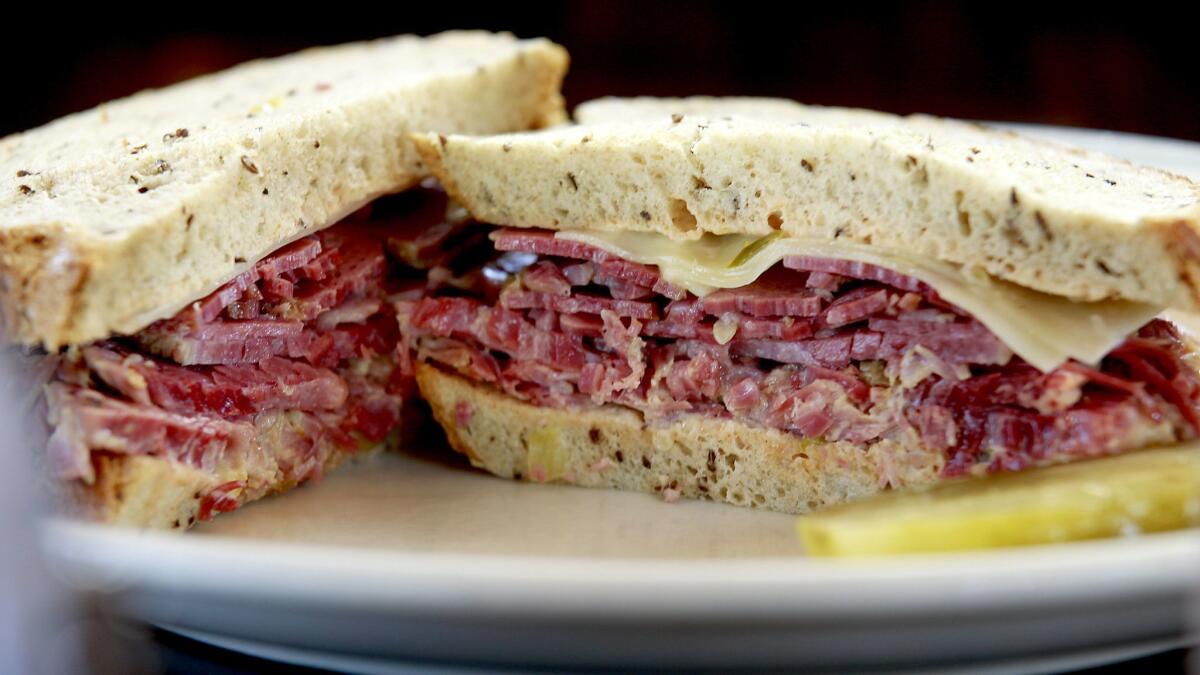Newsletter: Just in time for Labor Day, why ‘uncured’ deli meats aren’t as safe as you thought

- Share via
Welcome to the weekly newsletter of the L.A. Times Business Section. I’m consumer columnist David Lazarus, here today with a timely Labor Day look at deli meats — not that I’m looking to ruin your holiday party or anything.
Most of us probably believe, not unreasonably, that any package of luncheon meats that says “no nitrates or nitrites added” is probably better for you. Nitrates and nitrites are probable carcinogens, according to the World Health Organization.
However, Consumer Reports says that just because a label says “no nitrites,” it doesn’t mean there are no nitrites. What the label really means is that there are no synthetic nitrites. But the manufacturer still could have used nitrites from celery and other natural sources in curing the meat.
“Their chemical composition is absolutely the same, and so are the health effects,” CR quoted Joseph Sebranek, an Iowa State University professor, as saying.
The organization tested 31 deli samples and found that “products cured with nitrates and nitrites from natural sources had average levels of the chemicals that were similar to those cured with synthetic ones. And it didn’t matter what type of meat it was — chicken, ham, roast beef, turkey or salami.”
This just highlights the frequently bizarre world of food labeling, where the package may say one thing but the reality may be something else.
SEE ALSO: Enough with all the extra fees. Just tell me how much I’m really paying
As I’ve previously reported, even though most consumers seek out food labels containing the word “natural,” there’s actually no legal definition for the term “natural,” according to the Food and Drug Administration.
Generally speaking, the FDA says, natural foods should have no artificial ingredients, but there’s no law to that effect. Moreover, just because a food is said to be “natural,” that doesn’t mean it’s necessarily good for you. Sugar is a natural ingredient.
Also, keep this in mind: If a label says “100% organic,” the product was made solely with organic ingredients. A label that simply says “organic,” on the other hand, means 95% of the ingredients are organic. That leaves 5% of wiggle room.
A product that boasts of being “made with organic ingredients” means that at least 70% of the ingredients are organic. The other 30%, not so much.
Would it be better if the FDA made food labels more understandable? Absolutely. Until it does, though, the best thing consumers can do is to be well-informed about what labels really mean.
And now you are. Enjoy your holiday deli sandwich.
And while you’re noshing, here are some upcoming events and stories that caught my eye:
STORY LINES
The solar deal that wasn’t: The Los Angeles Department of Water and Power had secured a record-cheap solar deal -- less than 2 cents per kilowatt-hour. But getting it hooked up hasn’t been easy. The department’s Board of Commissioners voted not to send the contract to the City Council for approval because concerns had been raised by the labor union that represents utility employees.
You’re fired: We were told virtual reality would revolutionize home entertainment. But before it shows up in your living room, you might find it in your workplace’s human resources department. Startups are using virtual reality to train workers in difficult-to-teach soft skills — like firing someone. The idea behind the termination simulation is to make it easier to shrug off the pain and discomfort of letting someone go.
What’s driving automakers: President Trump wants to abolish the strict environmental standards the Obama administration placed on automakers. One would expect automakers to support the rollback. So how come some car companies are lining up with California in its efforts to restrict emissions?
WHAT WE’RE READING
Late start: Attention, aspiring tech founders: There’s still hope for those of us who no longer live in a dorm room. The creators of most successful technology startups are middle-aged, the New York Times reports.
Network connections: How exactly did Jeffrey Epstein — a man long accused of horrific behavior — get so cozy with an influential subset of scientists and academics? Wired poses the question, and asks why they didn’t turn him away. (Part of the answer: Money).
LOOKING AHEAD
The future of work: As soon as next week, state legislators could pass AB-5 — the controversial measure curbing businesses’ use of independent contractors. App-based technology companies have scrambled to exempt themselves from the bill’s provisions, but Gov. Newsom is expected to sign the bill without those carve-outs.
Let me know what you think of the newsletter. My email is david.lazarus@latimes.com, or you can find me on Twitter @Davidlaz. Also, tell all your social media pals to join the party.
Until next time, see you in the Business section.
More to Read
Inside the business of entertainment
The Wide Shot brings you news, analysis and insights on everything from streaming wars to production — and what it all means for the future.
You may occasionally receive promotional content from the Los Angeles Times.











